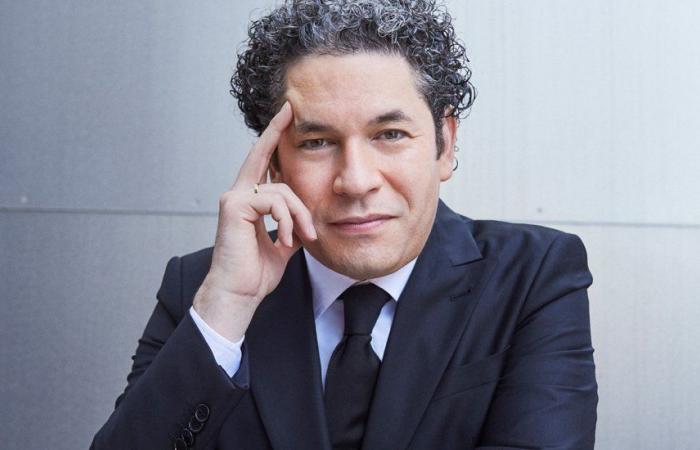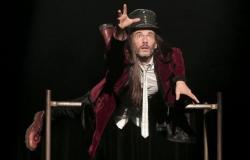More details
Paris. Philharmonie. Grande Salle Pierre Boulez. 11-I-2025. Gustav Mahler (1860-1911): Symphony No. 3 in D minor (1902); Josè Antonio Abreu (1939-2018): Only you give life to the wheat; Light Gun . Marianne Crebassa, mezzo-soprano. Paris Orchestra Choir, Youth and Children’s Choir of the Paris Orchestra, Simón Bolívar Symphony Orchestra, direction: Gustavo Dudamel
Like many other conductors, Gustavo Dudamel seems haunted by the Mahlerian symphonic corpus which he regularly performs on stage and on record at the head of different orchestras. HAS the Philharmonie de Paris is the Symphony No. 3 which has the honors of the stage, conducted with its Simón Bolívar Symphony Orchestra, preceded by two short choral pieces by Josè Antonio Abreu in a vibrant tribute paid to the founder of El Sistema from which conductor and musicians come.
To introduce this cosmic anthem that is the Symphony No. 3 by Gustav Mahler, Gustavo Dudamel and the Choir of the Orchester de Paris perform two short choral pieces inspired by Nature, composed by Josè Antonio Abreu, founder of the Venezuelan musical educational program “El Sistema” whose 50th anniversary is being celebrated this yeare anniversary of the creation in 1975: El Sistema offers “an alternative method of learning music which also allows the social integration of disadvantaged young people”, a system taken up today by numerous associations in different countries around the world.
We admire the luminous clarity and grace of the polyphony of these two pieces for women’s and children’s choir. The first, pastoral, shrouded in poetry “ Sun that gives life to the wheat » (Sun that gives life to wheat) on a poem by Manuel Felipe Rugeles, and the second, « Light, tú » (You, the Light), more spiritualized and vertical on a poem by Juan Ramon Jimenez.
Already given on record with the Berliner Philharmoniker in 2021 (DG), and “live” on this same stage of the Philharmonie de Paris with the LA Philharmonic in 2016, the Symphony No. 3 (1902), the longest of Gustav Mahler’s symphonic corpus, fits quite naturally into this highly spiritualized program designed as a hymn to Nature and Creation. The work is remarkably well executed, carried from start to finish by an interpretation that is right in tone, dazzling in virtuosity, contrasting, animated by a constant concern for architecture, carried by an epic breath capable of giving substance to this progression. initiatory” from the almost expressionist, chaotic and shattering accents of the first movement to the serenity full of fervor of the final adagio which is not without announcing that of the Ninth…
By the breadth of its purpose and the height of its inspiration, the Symphony No. 3 is a gigantic, monstrous work where Mahler offers us more than a world but a universe, even a new cosmogony! Completely inspired by Nature, consoling Nature, charged with love, it responds to an overall plan, which is undoubtedly the most ambitious ever conceived by a symphonist: starting from matter, from rocks, Mahler already sees a immense epic which will climb one by one the different stages of Creation to reach Man before rising to universal Love conceived as supreme transcendence. It consists of six movements: “Pan awakens, summer comes, what the rocks please me”; “What meadow flowers please me”; “What the animals of the forest please me”; “What the Night (Man) tells me”; “What the morning bells (Angels) please me; “What Love tells me”.
The first movement, Strongevokes the Homeric and Orphic myths of the Creation of the World, describing the awakening and fertilization of matter by the creative spirit. (Eros giving form to Chaos). Demiurge of one evening, after a start loaded with anticipation, Gustavo Dudamel brings together the orchestral masses in a cleverly organized maelstrom (clarity of the set-up, arrangement of sound plans, counter-chants) made of an alternation of agitated episodes (brass, double bass and percussion) and more lyrical passages (small harmony and strings) punctuated by superb solo performances (solo trombone heartbreaking, duet with the English horn) on a tense dynamic constantly revived. The following three movements: Menuetto time carefree, lyrical and dancing gives pride of place to the oboe, strings and harp; follows the Convenient Just kidding a little creaky, worried and mysterious, taken from the Wunderhorn (« Ablosang im summer “) filled with the sounds of the forest with his famous postilion horn solo performed from behind the scenes; then, as if emerging from the murmur of the cellos, the song O Mensch! for alto voice taken from “ Zarathustra » by Nietzsche, a moment of meditation where man frees himself from his doubts to find the path to truth: “ O man pay attention…all joy longs for eternity » superbly sung by Marianne Crebassa, who seduces at the same time with the beauty of the tone, the power and the depth of intonation; before the fifth movement, Funny at pacejoyful, full of freshness and impertinence marks the accession to the higher forms of existence with the appearance of the chorus of women and children on the poem “ Poor children’s song » taken from Wunderhorn which affirms the rejoicing of the angels at the announcement of the remission of sins prefiguring the “ Heavenly Life » of the Fourth Symphony. All meditation (sumptuous strings)Adagio final, very spiritualized, charged with an intense fervor which leaves you on the verge of tears, brings a grandiose and optimistic conclusion to this memorable interpretation, greeted by a long, very long standing ovation from the audience. A great way to celebrate the 10th anniversary of the Philharmonie de Paris, inaugurated on January 14, 2015!
Photo credit: © Danny Clinch/ LA Phil
Read also:
The splendors of Mahler’s 3rd by OPS and Aziz Shokhakimov in Paris
(Visited 3 times, 3 visits today)
More details
Paris. Philharmonie. Grande Salle Pierre Boulez. 11-I-2025. Gustav Mahler (1860-1911): Symphony No. 3 in D minor (1902); Josè Antonio Abreu (1939-2018): Only you give life to the wheat; Light Gun . Marianne Crebassa, mezzo-soprano. Paris Orchestra Choir, Youth and Children’s Choir of the Paris Orchestra, Simón Bolívar Symphony Orchestra, direction: Gustavo Dudamel
Keywords of this article






